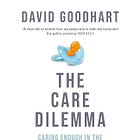Missed the homework? Here’s that post:
Show notes
All times are approximate… but better than nothing, maybe?
8:27 | George mentions orchestras because she read this article in the Financial Times on her way home from Europe:
The Baumol effect describes the challenge that arises when some sections of the economy are rapidly advancing while others are standing still. If you would like to listen to people play Haydn live, you will probably need to pay them a competitive wage. And in a flourishing economy, what counts as a competitive wage is always increasing. If the productivity of musicians doesn’t change, but their wages keep growing to keep pace with the rest of the economy, then paying people to perform Haydn is going to feel more and more like an expensive luxury.
19:17 | A good summary of the global fertility crisis and its impacts:
20:49 | The Population Bomb
24:25 | Epidurals: they lengthen labor, increase the need for vacuum and forceps delivery, increase the need for episiotomy (cutting the vagina), and numb the urge to push
31:02 | Katie Herzog interview on Louis Perry’s Maiden, Mother, Matriarch podcast: “Where Have All the Lesbians Gone?” (In the last 7 minutes of the podcast, Katie describes her wife “becoming gay” after moving to Seattle and realizing it was possible, rather than being “born gay.”)
33:53 | Konstantin Kisin on Hungary’s pro-child policies
36:23 | Women as a percentage of the labor force
28:12 | Diana Ross & The Supremes performing “Love Child” on The Ed Sullivan Show (September 29, 1968)
41:33 | Here’s a documentary about the Magdalene Laundries; full disclosure, George knows about them from seeing “The Magdalene Sisters” over 20 years ago.
43:00 | The Unspeakeasy; women, check it out! Alas, our heterodox-before-it-was-cool founder, Megham Daum, lost her Altadena home in the LA Fires. So there’s never been a better time (for men and women) to support her.
43:27 | Here’s the graphic:
47:30 | Olga Khazan, “Doomed to Be a Tradwife” in The Atlantic
48:27 | Fair Play card deck
54:56 | Illich on “key words” (in, of course, Gender)
More than I realized when I began, the ordinary speech of the industrial age revealed itself as both genderless and sexist. I knew that gender was dual, but my thinking was constantly distorted by the genderless perspective that industrialized language necessarily enforces. I found myself caught up in a distracting web of key words. I now see that key words are a characteristic feature of modern language, but clearly distinct from technical terms. “Automobile” and “jet” are technical terms. And I have learned that such words can overwhelm the lexicon of a traditional language. When this occurs, I speak of technological creolization. A term like “transportation,” however, is a key word. It does more than designate a device – it imputes a basic need. [emphasis ours]
57:04 | Camille Paglia, Free Women, Free Men (likely your next homework assignment)
1:04:03 | George is a believer in Jordan Peterson’s Rule #5; making your children acceptable to other adults (which also makes them able to make friends among their peers) is crucial.
1:04:13 | “The Parents who ‘Don’t Teach Sharing’”, by Emi Nietfeld (in The Cut)
1:04:13 | “Conservatism Against Itself,” by Christopher Lasch (in First Things)
[T]he reduction of labor to a commodity — the essence of capitalism — required the elimination of all the social bonds that prevented the free circulation of labor. The destruction of the medieval guilds, the replacement of local government by a centralized bureaucracy, the weakening of family ties, and the emancipation of women amounted to “successive steps in the . . . cheapening of the raw material of labor,” all achieved under the “watchword” of progress. … In the twentieth century, conservatism has incongruously allied itself with the free market, including the free market in labor. What passes for conservatism, in other words, has allied itself with the very forces that have brought about the “progressive shattering to atoms of our social system.”
1:17:10 | “New Year’s Resolution: Bring Back the Aunties,” Mary Harrington on her Substack, Reactionary Feminist
1:18:39 | “New mothers face barriers getting the mental health care so many need,” on The PBS Newshour
1:29:04 | “Parent shaming is natural,” by Toke K, on his Substack, Wood From Eden
Quotes
Is it bad if the world runs out of people?
In 2100, Koreans will be remembered as a quasi-mystical people who emerged from a period of violent division, made TVs 96,000% cheaper and then inexplicably vanished. (164)
The end of the Second World War and optimism about the future has usually been the main explanation for the 1940s/1950s baby boom, which briefly defied the 200-year trend that rising incomes mean fewer babies. A recent paper has, however, challenged this idea, arguing that not only did the baby boom start before the end of the war, across a broad range of countries, but it was driven not so much by either optimism or returning soldiers but rather by practical things such as medical improvements that made giving birth safer, domestic technologies from electrification to refrigeration that made everyday life easier for mothers, and plentiful housing. Something similar could, therefore, in principle happen again even without a return to high levels of economic growth and a new, optimistic outlook. Perhaps a drug that makes childbirth completely painless or safely regularises babies’ sleep patterns. (163, emphasis ours)
The role of the state: will policy be enough?
The daughter of an acquaintance of mine got a top job at a well-known entertainment company on a salary of £160,000 a year, and no sooner had she been offered the job than she discovered she was pregnant. She offered not to take up the post but the company, perhaps aware of their legal obligations, insisted that she still join them. She worked for the company for a few months then took a year’s maternity leave on full pay; she then returned for a year and then became pregnant again and repeated the process. (231)
Policy should support both work-focused and family-focused mothers. Family-focused women are less visible in public life, and their preference for more state support to stay at home when children are young is eclipsed in the debate about family policy by the arguments about improved childcare, flexible working and the interests of those who want to minimize the impact of motherhood on career progression. (21)
The elephant in the nursery: feminism
Women are having fewer children, later in life. For most of history, society has, in a sense, free-ridden on women. They have borne most of the physical and emotional cost of delivering and raising babies. Today, thanks to reliable contraception and sex equality, having children is a choice in rich countries. Women are increasingly reluctant to pay the price now they have other options. (14)
The meek will inherit the Earth
Nobody wants to go back to the days of large families with mothers trapped in domestic drudgery into their 50s. Nevertheless, a norm of one child families is a dismaying prospect, with unpredictable consequences for the national psyche. (23)
My two graduate daughters are in their early 30s and pursuing demanding full-time careers, as are their two younger brothers. All are unmarried and without children. (27)
One simple way that the state can help is by providing a single online family hub with authoritative information about all manner of things: from nutrition, breastfeeding (including expressing and storing), sleep deprivation, and dealing with the physical and sometimes mental scars of childbirth, to reliable directions about child development and advice on how to protect the mother–father relationship. There is a huge amount of free advice already to be found online, but young mothers do not know who to trust and the imprimatur of the state would be a reassurance. (248)

















Share this post